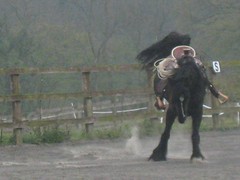Horses are emotional creatures. Their first response to most new things is an emotional one – usually fear, often turning that into inquisitiveness once they have established that the thing won’t harm them. For many years I used to wonder whether my horse was afraid or defensive or angry in some way until I realised that firstly I will never actually know what emotion the horse is experiencing at this moment and secondly it doesn’t really matter. I may not know whether my horse is angry or afraid – for all we can know there might be no similarity at all between emotions as horses experience them and emotions as we experience them – but it doesn’t change what I do. I need to let them work through the emotion they are experiencing and help them to be calm again.
The place where I begin to work on that is by letting them move – it is absolutely counterproductive to try to stop a horse from moving their feet if they are emotional – but to direct that movement and to ask them to bring their attention back to me. It seems to me that the emotion takes the horse’s mind off what I am asking them to do and gets them thinking more about whatever it is that is causing them to feel that way. By getting them thinking about what I am asking them for ( and importantly by getting them thinking rather than just reacting ) I can break that pattern a little. So I’ll ask for regular changes of direction and typically I won’t put any more energy into the system- I won’t ask them to go faster – but I will let the energy that they have put in drain out by simply waiting for them to come through.

The other part of anything we do with horses is how we react to things as well. I am lucky in that I am very calm and patient by nature so it isn’t too hard for me to avoid getting too involved when a horse gets emotional. This is critically important – if the horse is emotional and I respond in kind then that is very likely to make matters worse as I will effectively be telling them that there is something to be getting emotional about. If I can remain as a calm place that can make my presence much more reassuring for the horse when they are concerned and make my company somewhere they would like to be.
One thing I found helpful when I wanted to get better at being this way for my horses was to think of myself as being part of the environment rather than part of the emotional dynamic the horse has chosen, so I try to imagine that mentally I am more like an oak tree or rocks that the sea washes around. Whatever the horse does happens in the environment around me- if the horse wants to push or pull on me there will be no more benefit to them than if they chose to push or pull on a tree – I may have to do something to change what they are doing, but my plan is simply to keep putting things out the way I would like the horse to respond to them and let the emotions wash away. The quicker that the horse can go back to thinking about what I am asking them for, the sooner they will be able to think clearly again and we can go back to some useful work.
1 reply on “Emotion and calm”
[…] But our horses really need us to be able to say no. They need our relationship to be absolutely black and white, with total clarity about every line and boundary. Most of the way they learn from us will be when they ask us “can I do this?” In many cases we will answer “no.” They need us to be able to do that consistently, clearly and calmly. […]